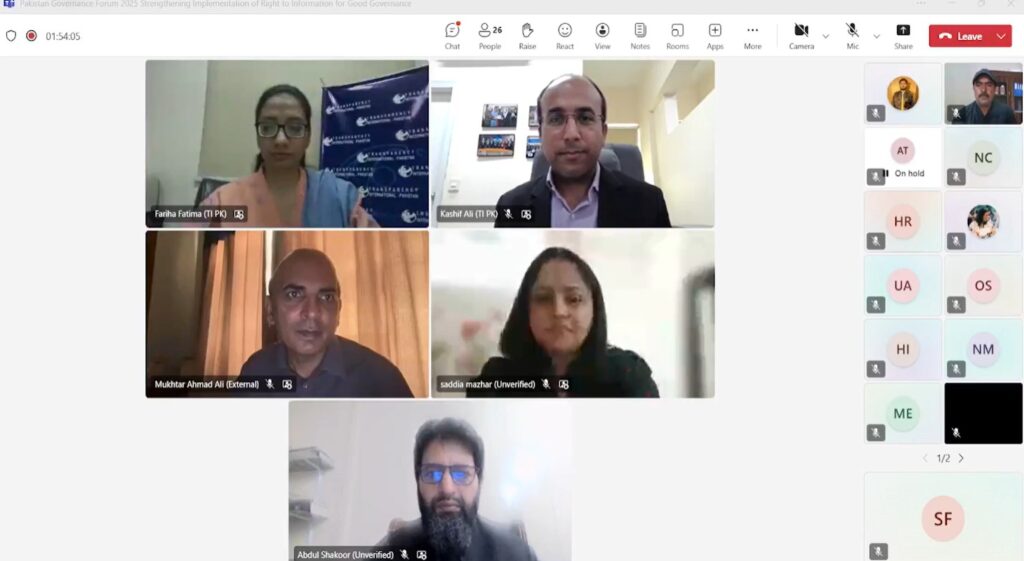Bureaucratic Resistance Is Paralyzing Balochistan’s RTI Commission, Chief Says

Balochistan’s Chief Information Commissioner, Abdul Shakoor, has said that the Balochistan Information Commission is facing serious challenges due to strong bureaucratic resistance and lack of resources. He was speaking during an online session organized by Transparency International.
Shakoor noted that institutions and commissions established in the country to ensure transparency have faced obstacles in various forms, and the Balochistan Information Commission is no exception. He pointed out that, in general, citizens in the province do not have the right to question public institutions or seek information related to matters of public interest. According to him, there is a lack of political will to implement the Right to Information (RTI) law in the province.
He explained that although the Commission has been in existence for the past eight to nine months, it has encountered severe resistance from the bureaucracy since its inception. Even the required regulations for appointments were not fulfilled. He added that bureaucratic authorities created hurdles in providing budget and staff, maintaining that the Commission should operate voluntarily without the need for financial support.
“When we demanded an office for the Commission, we were told that there was no immediate need and that a single room in any government building would suffice,” Shakoor said. He emphasized that while the provincial government established the Commission in compliance with High Court orders, it has not been made functional.
Despite these barriers, the Chief Information Commissioner stated that the Commission has begun fulfilling its responsibilities with the assistance of various NGOs. He revealed that letters were sent to around 70 departments for the appointment of Information Officers, but only four departments responded. Similarly, letters were issued for proactive disclosure of information, but no institution has yet replied.
Shakoor stressed that the Commission, even amid a severe shortage of resources, remains committed to carrying out its duties and upholding the principle of citizens’ right to information in Balochistan.
Also Read: RTI: Supreme Court of Pakistan Ordered to Release Staff Information

Right Decisions by Information Commissions Essential for Public Trust: Mukhtar Ahmad Ali
Executive Director of the Centre for Peace and Development Initiatives (CPDI), Mukhtar Ahmad Ali, has stressed that correct and fair decisions by Information Commissions are vital to building public trust in access-to-information laws.
Mukhtar Ahmad Ali said that the most effective way to raise awareness about access-to-information laws is through the decisions of the Information Commissions. “If a citizen approaches an Information Commission for access to information and the commission successfully ensures the provision of the requested information or rules in their favor, that individual becomes a walking advertisement for the commission,” he explained. He added that such citizens will not only continue to use the law themselves but will also encourage others to do so.
However, he cautioned that if commissions fail to make right decisions or nitpick over citizens’ applications, it would further erode trust in institutions. “In an environment where public confidence in state institutions is already lacking, people will conclude that there is no real benefit in using access-to-information laws,” he said.
Ali further pointed out that, like the Balochistan Information Commission, other information commissions in Pakistan have also faced serious challenges since their inception, and these issues persist even today.
Access-to-Information Laws Can Help Counter Fake News: Sadia Mazhar
Journalist Sadia Mazhar has said that access-to-information laws can play an important role in combating fake news and disinformation. She shared her views during a session organized by Transparency International, highlighting the value of these laws for both journalists and the public.
Mazhar emphasized that it is equally important to raise awareness about the use of access-to-information laws within news organizations. According to her, better understanding of the law can enable journalists and media houses to rely on verified information, ensuring more accurate reporting and limiting the spread of misinformation.
Citing her own experience, she explained that two years ago she submitted a request under the Right to Information framework to evaluate the performance of representatives elected from her hometown, Sahiwal, in the Punjab Assembly. At the time, such information was not available on the assembly’s website. However, following the decision of the Punjab Information Commission, these details are now publicly accessible online for all citizens.
Mazhar said this example demonstrates how effective use of information laws can promote transparency and empower citizens, while also helping the media provide fact-based reporting.
Also Read: 11 suspects arrested in Balochistan couple’s killing
Lack of Essential Information on Government Websites Alarming: Kashif Ali
Executive Director of Transparency International Pakistan, Kashif Ali, has expressed concern over the unavailability of essential information on government websites, calling it a serious issue that undermines the purpose of access-to-information laws.
Speaking on the importance of proactive disclosure, Ali noted that this section of the law is designed to ensure that citizens should not have to approach an institution or commission to obtain basic public information. Instead, such information should be readily available online for everyone.
“Unfortunately, in Pakistan, government institutions fail to provide this information on their official websites,” he said. Ali further highlighted that data regarding the implementation of access-to-information laws is also missing from the websites of information commissions and related bodies. “This data should be compulsorily published by both the commissions and public institutions,” he stressed.
Ali warned that the lack of transparency not only weakens the effectiveness of access-to-information laws but also discourages citizens from exercising their right to information.
Also Read: Climate Change threatens Date Farms in Balochistan




